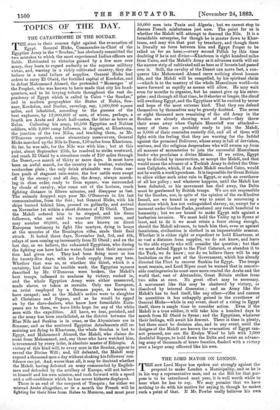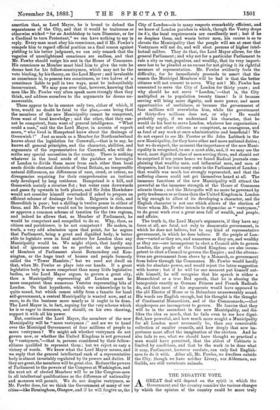THE LORD MAYOR ON LONDON.
THE new Lord Mayor has spoken out strongly against the proposal to make London a Municipality, and as he is in his way a representative man, and as the Bill for that pur- pose is to be introduced next year, it is well worth while to hear what he has to say. We may premise that we have nothing to do with his motive for saying it, though he makes such a point of that. If Mr. Fowler really believes his own
assertion that, as Lord Mayor, he is bound to defend the separateness of the City, and that it would be traitorous or otherwise 3vicked "for an Archbishop to turn Dissenter, or for a Cardinal to turn Protestant," we can have nothing to say in reply. Every man must obey his conscience, and if Mr. Fowler's compels him to regard official position as a final reason against yielding to his better judgthent, we can only remark that the vagaries of unenlightened conscience are endless, and that Mr. Fowler should resign his seat in the House of Commons. His conscience as Member must bind him to give the vote he deems best for his fellow-countrymen which may not be the vote binding, by his theory, on the Lord Mayor ; and invaluable as Conscience is, to possess two consciences, or two halves of a conscience liable to pull in two ways, must be indescribably inconvenient. We may pass over that, however, knowing that men like Mr. Fowler very often speak more strongly than they think, and address ourselves to the arguments he deems un- answerable.
These appear to be in essence only two, either of which, if true, would no doubt be fatal to the plan,—one being that the members of the new Municipality cannot be competent, from want of local knowledge • and the other, that they can- not be competent, from want of general intelligence. "What could a man," said the the Lord Mayor, in accents of superb scorn, "who lived in Hampstead know about the drainage of Greenwich ?" Just as much as a Member for Northumberland knows about the legislation for Cornwall,—that is to say, he knows all general principles, and the character, abilities, and arguments of the representative for Cornwall, who will de- scribe any special necessities in the county. There is nothing whatever in the local needs of the parishes or boroughs of London to divide them more from each other than local needs divide electoral districts of Great Britain, no insuperable natural differences, no differences of race, creed, or colour, no divergencies requiring for their comprehension an instinct only developed by long residence. Hampstead is a hill, and Greenwich mainly a riverine flat ; but water runs downwards and gases fly upwards in both places, and Sir John Hawkshaw would not consider himself overtasked if asked to prepare an efficient scheme of drainage for both. Belgravia is rich, and Shoreditch is poor ; but a shilling is twelve pence in either of them, and Mr. Fowler would not be incompetent to denounce or approve a common scheme of taxation for the two regions, and indeed he allows that, as Member of Parliament, he would be competent and compelled to do so. Why, then, as citizen and parishioner, is he not competent ? He makes, in truth, a very odd admission upon that point, for he argues that Parliament, being a great and dignified body, is better able to legislate even in local matters for London than any Municipality would be. We might object, that hardly any kind, of ignorance can be so perfect as the ignorance of Members of Parliament about Berniondsey and Ken- nington, or the huge tract of houses and people formerly called the "Tower Hamlets ;" but we need not dwell on that, when Mr. Fowler so plays into our hands. If a great legislative body is more competent than many little legislative bodies, as the Lord Mayor argues, to govern a great city, then a Municipality representing all London must be more competent than numerous Vestries representing bits of London. On that hypothesis, which we acknowledge to be quite sound, but which comes oddly from a fanatic for local self-government, a central Municipality is wanted now, and at once, to do the business more nearly as it ought to 1:,:e done. The Lord Mayor is, in fact, arguing for the very scheme which he is so eager to denounce, and should, on his own showing, support it with all his power.
But, continued the Lord Mayor, the members of the new
Municipality will be "mere vestrymen ;" and are we to hand over the Municipal Government of four millions of people to mere vestrymen ? We might ask whether vestrymen do not govern now, or whether the United Kingdom is not governed by "vestrymen,"—that is, persons considered by their fellow- citizens qualified to represent them ; but we reject so easy a victory of words. We know what the Lord Mayor means, and we reply that the general intellectual rank of a representative body is almost invariably regulated by its powers and duties. If they are great, the members will be great also. Reduce the powers of Parliament to the poweis of the Congress at Washington, and the next set of elected Members will be as like Congress-men in all intellectual qualifications as the difference of nationality and manners will permit. We do not despise vestrymen, as Mr. Fowler does, for we think the Government of many of our cities—like Birmingham, Glasgow, and if he will forgive us, the City of London—is in many respects remarkably efficient, and we know of London parishes in which, though the Vestry drops its h's, the local requirements are excellently met ; but if he so despises them, and wants better men, his course is so to elevate the Municipality that the people will see at once that Vestrymen will not do, and will elect persons of higher intel- lectual calibre. They do that, the Lord Mayor allows, for the general Parliament; and why not for a particular Parliament to rule a city so vast, populous, and wealthy, that its very import- ance has to be pleaded as an excuse for not giving it its rightful measure of representation. Mr. Fowler evidently feels the difficulty, for he immediately proceeds to assert that the reason the Municipal Members will be bad is that the better citizens will not consent to serve. Why not? Mr. Fowler has consented to serve the City of London for thirty years ; and why should he not serve "London,"—that is, the City multiplied as to population twenty times ? Is it because serving will bring more dignity, and more power, and more opportunities of usefulness, or because the government of four millions will overwhelm him, while the government
of thirty-five millions does not, or why I He would probably reply, if we understand his character, that he would do his best to serve London, whatever her organisation ; and why not other citizens as competent, as courageous, and as fond of any work at once administrative and beneficial ? We do not expect to see Mr. Forster or Sir John Lubbock in the new Municipality, for they have other and more national duties ; but we do expect, the moment the importance of the new Muni- cipality is recognised, to see a most able, and, if we may use the word, most dignified class of men serving there, and should not be surprised if ten years hence we found Radical journals com- plaining that wealthy men, and influential men, and men of eloquence, had far too many seats in the Parliament of London ; that wealth was much too strongly represented, and that the suffering classes could not get themselves heard at all. The immense functions of the new Municipality will attract the powerful as the immense strength of the House of Commons attracts them ; and the Metropolis will no more be governed by petty tradesmen or artisans than the United Kingdom is. London is big enough to allow of its developing a character, and the English character is not one which allows of the election of those whom Mr. Fowler intends to stigmatise as "vestrymen," to do great work over a great area full of wealth, and people, • and affairs.
The truth is, the Lord Mayor's arguments, if they have any force at all, are fatal, not only to democratic government, in which he does not believe, but to any kind of representative government, in which he does believe. If the people of Lon- don—varied as they are, and numerous as they are, and wealthy as they are—are incompetent to elect a Council able to govern London, the people of the United Kingdom are also incom- petent to elect a Council to govern the Empire ; and the alterna- tives are government from above by a Monarch, or government from below through the Communes. Mr. Fowler would hardly wish for absolute power, and would reject the latter suggestion with horror ; but if he will for one moment put himself out- side himself, he will recognise that his speech is either a Monarchical or a true Red speech, that he is abusing the bourgeoisie exactly as German Princes and French Radicals do, and that most of his arguments would have appeared to the old Elector of Hesse or to Delescluze unanswerably sound. His words are English enough, but his thought is the thought of Continental Monarchists, and of the Communards,—that shopkeepers are incompetent to govern. He fancies that they will be in the ascendant in the new Municipality, and dis- likes the idea so much, that he fails even to see how digni- fied, how powerful, and how much more sought a Municipality for all London must necessarily be, than any conceivable collection of smaller councils, and how deeply that new im- portance must affect the imagination of the electors. And he also fails to see, what we should have thought so practical a man would have perceived, that the ablest of Cabinets is limited by conditions, and that be the work to be done what it may, Parliament, however resolute, can only find English- men to do it with. After all, Mr. Fowler, we dwellers outside the City, though we have neither Livery, nor Aldermen, nor Guilds, are still vertebrate animals.







































 Previous page
Previous page